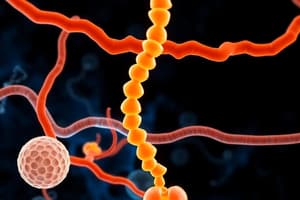Podcast
Questions and Answers
What is the first step in the biosynthesis of glycogen?
What is the first step in the biosynthesis of glycogen?
- Activation of glucose-1-phosphate to UDP-glucose
- Isomerization of glucose-1-phosphate to glucose-6-phosphate
- Transfer of the glucosyl residue to an amylose chain
- Isomerization of glucose-6-phosphate to glucose-1-phosphate (correct)
Which enzyme catalyzes the isomerization of glucose-6-phosphate to glucose-1-phosphate?
Which enzyme catalyzes the isomerization of glucose-6-phosphate to glucose-1-phosphate?
- Glucose-6-phosphate dehydrogenase
- Phosphoglucomutase (correct)
- Glycogen synthase
- UDP-glucose pyrophosphorylase
What is formed after the activation of glucose-1-phosphate during glycogenesis?
What is formed after the activation of glucose-1-phosphate during glycogenesis?
- Glycogen
- Glucose-6-phosphate
- UDP-glucose (correct)
- Glucose
In glycogenesis, what happens to UDP-glucose after its formation?
In glycogenesis, what happens to UDP-glucose after its formation?
Which of the following is NOT part of the three sequential steps in glycogenesis?
Which of the following is NOT part of the three sequential steps in glycogenesis?
Which enzyme is primarily responsible for the process of glycogenolysis?
Which enzyme is primarily responsible for the process of glycogenolysis?
What role does epinephrine play in glycogen metabolism?
What role does epinephrine play in glycogen metabolism?
What is the state of glycogen synthase when phosphorylated?
What is the state of glycogen synthase when phosphorylated?
Which molecule is involved in activating glycogen phosphorylase through phosphorylation?
Which molecule is involved in activating glycogen phosphorylase through phosphorylation?
What is the effect of Inhibitor 1 on glycogen phosphorylase?
What is the effect of Inhibitor 1 on glycogen phosphorylase?
What is the role of cAMP in the activation of protein kinase A (PKA)?
What is the role of cAMP in the activation of protein kinase A (PKA)?
What does the binding of epinephrine lead to the conversion of?
What does the binding of epinephrine lead to the conversion of?
How does PKA affect glycogenolysis when activated?
How does PKA affect glycogenolysis when activated?
What mechanism is shared between the activation of the b-adrenergic receptor and the glucagon receptor?
What mechanism is shared between the activation of the b-adrenergic receptor and the glucagon receptor?
Which enzyme is activated by cAMP to influence glycogen metabolism?
Which enzyme is activated by cAMP to influence glycogen metabolism?
What is the effect of PKA on glycogenesis?
What is the effect of PKA on glycogenesis?
What are the products formed by the action of adenylate cyclase?
What are the products formed by the action of adenylate cyclase?
Which of the following describes the effect of epinephrine-secretion in the liver or muscle cells?
Which of the following describes the effect of epinephrine-secretion in the liver or muscle cells?
What occurs after cAMP binds to the regulatory subunit of PKA?
What occurs after cAMP binds to the regulatory subunit of PKA?
Flashcards are hidden until you start studying
Study Notes
Epinephrine and Glycogen Metabolism
- Epinephrine binds to β-adrenergic receptors, activating adenylate cyclase.
- Activation of adenylate cyclase converts ATP to cyclic AMP (cAMP), a secondary messenger.
- cAMP activates protein kinase A (PKA) by binding to its regulatory subunits, releasing the catalytic subunits.
Glycogenolysis and Glycogenesis Regulation
- Glycogenolysis is stimulated by the conversion of phosphorylase-b (inactive) to phosphorylase-a (active) via PKA activation.
- Glycogenesis is inhibited as PKA facilitates the conversion of glycogen synthase I (active) to glycogen synthase D (inactive).
- Phosphatase activity is inhibited, further promoting glycogen breakdown and reducing synthesis.
Glycogen Synthesis Steps
- Glycogen biosynthesis involves three steps:
- Conversion of glucose-6-phosphate to glucose-1-phosphate by phosphoglucomutase.
- Activation of glucose-1-phosphate to UDP-glucose.
- Transfer of glucose units from UDP-glucose to growing glycogen chains.
Role of Glucagon
- Similar to epinephrine, glucagon binds to its receptor, activating adenylate cyclase and increasing cAMP levels.
- The effect of glucagon mirrors that of epinephrine, promoting glycogenolysis while inhibiting glycogenesis.
Tissue-Specific Metabolism
- The brain and red blood cells uptake glucose through insulin-independent GLUT receptors (GLUT1), engaging in glycolysis and the pentose phosphate pathway for energy and NADPH production.
- Muscle cells utilize glucose via the insulin-sensitive GLUT4 transporter, enabling efficient energy utilization.
Additional Notes
- Inhibitor 1 regulates the activity of protein phosphatase, affecting the phosphorylation status of glycogen synthase and phosphorylase.
- Overall, epinephrine plays a crucial role in increasing blood glucose availability during stress by promoting glycogenolysis and inhibiting glycogenesis in the liver and muscles.
Studying That Suits You
Use AI to generate personalized quizzes and flashcards to suit your learning preferences.




